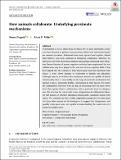How animals collaborate : underlying proximate mechanisms
Date
09/2020Metadata
Show full item recordAbstract
Collaboration or social interactions in which two or more individuals coordinate their behavior to produce outcomes from which both individuals benefit are common in nature. Individuals from many species hunt together, defend their territory, and form coalitions in intragroup competition. However, we still know very little about the proximate mechanisms underlying these behaviors. Recent theories of human cognitive evolution have emphasized the role collaboration may have played in the selection of socio‐cognitive skills. It has been argued that the capacity to form shared goals and joint intentions with others, is what allows humans to collaborate so flexibly and efficiently. Although there is no evidence that nonhuman animals are capable of shared intentionality, there is conceivably a wide range of proximate mechanisms that support forms of, potentially flexible, collaboration in other species. We review the experimental literature with the aim of evaluating what we know about how other species achieve collaboration; with a particular focus on chimpanzees. We structure the review with a new categorization of collaborative behavior that focuses on whether individuals intentionally coordinate actions with others. We conclude that for a wider comparative perspective we need more data from other species but the findings so far suggest that chimpanzees, and possibly other great apes, are capable of understanding the causal role of a partner in collaboration.
Citation
Duguid , S & Melis , A 2020 , ' How animals collaborate : underlying proximate mechanisms ' , WIREs Cognitive Science , vol. 11 , no. 5 , e1529 . https://doi.org/10.1002/wcs.1529
Publication
WIREs Cognitive Science
Status
Peer reviewed
ISSN
1939-5078Type
Journal item
Description
Funding: Templeton World Charity Foundation (Grant Number(s): TWCF0264).Collections
Items in the St Andrews Research Repository are protected by copyright, with all rights reserved, unless otherwise indicated.

